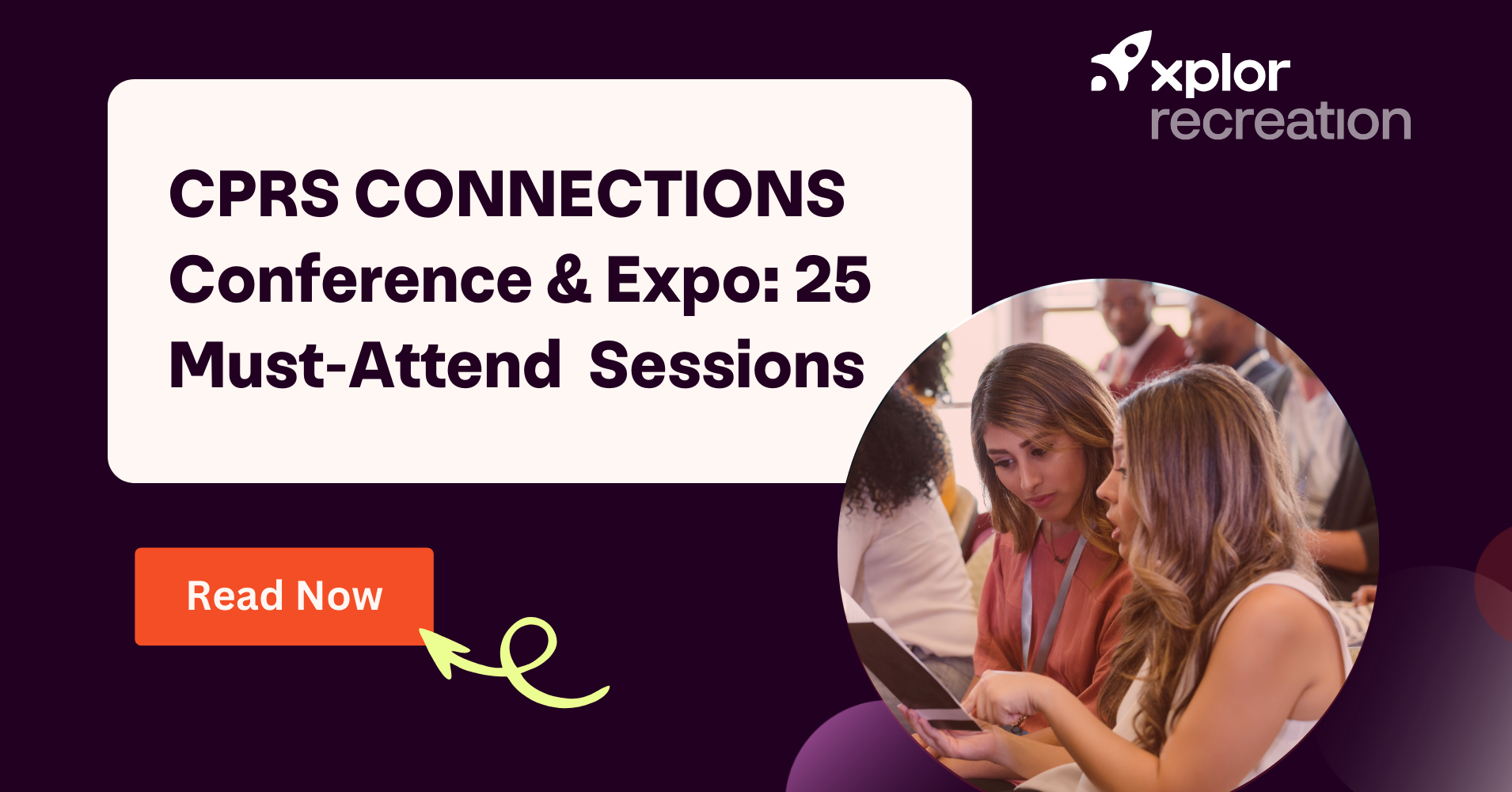6 Summer Camp Tips from Parks and Recreation Pros
For many agencies, summer is one of the busiest seasons of the year—especially for those who run camps.
With so much effort and coordination going into running these programs, we wanted to offer a few ideas to help ensure your camps go as smoothly as possible this summer—and for years to come. And so, we reached out to a few parks and recreation professionals from across America and asked them for their top tips on running successful summer camps.
Read on to discover six tips from our group of experts to help your team support your community, motivate your staff, and offer memorable experiences to your campers!
Skip ahead to the sections that interest you most:
👋 Meet Our Panel of Parks and Recreation Pros
☀️ How to Run Successful Summer Camps this Year
💸 Tip 1: Make Camps Affordable and Accessible
👫 Tip 2: Run Camps that Address Your Community’s Needs
✨ Tip 3: Focus on Creating Memorable Experiences
🙌 Tip 4: Motivate and Support Your Staff
💬 Tip 5: Streamline Communication with Families
🗓️ Tip 6: Start Planning for Next Summer Now

Meet Our Panel of Parks and Recreation Pros
A huge thank you to our panel of parks and recreation professionals who contributed to this topic! We put this article together with insights from the following summer camp experts:
🌵 Julie Craig, Director of Community Impact, Arizona Youth Partnership
🏔️ Jessica Hawkins, Day Camp and Preschool Director, Town of Parker
🏞️ Carmen Brashier, Aquatics and Athletics Supervisor, City of Sedona
🌇 Jay Tryon, Deputy Director, City of Concord Parks and Recreation
Continue reading to find out what advice they shared with our team!
How to Run Successful Summer Camps this Year
Across North America, many agencies run kids’ camps for their communities during the summer months. It can be a busy and stressful time for your staff if you’re not prepared. In this section, we share tips from our panel of experts on how you can make sure your camps are a success each and every summer.
Tip 1: Make Camps Affordable and Accessible
For many community members, the camps that agencies offer are some of the most affordable summer programs available. And while sometimes it can be more challenging to keep costs low, here are a few ideas on how your team can make your camps as affordable and accessible as possible.
Offer a Free Camp Option Each Summer
The cost of multiple week-long camps and activities adds up quickly for many families. If your agency has the ability to offer one or two free programs—even if it’s only a day long—Julie Craig from Arizona Youth Partnership recommends trying this approach.
“There are less summer camps available than there once was, and the price to attend those that exist are extremely expensive. We offer one-day Youth Leadership Conferences throughout the summer that are free to attend.”
— Julie Craig, Director of Community Impact, Arizona Youth Partnership
Remove Transportation Barriers Whenever Possible
Accessibility isn’t just about affordability. To ensure that your summer camps are accessible to everyone, Julie Craig also recommends offering your programs in different areas of your community. Especially if some of your residents are in more isolated, rural neighborhoods.
“We provide the same Youth Leadership Conference in 11 or 12 rural locations across Arizona on different days. This removes the barrier of transportation for parents. We do our best to offer them in the month of June, right after school gets out, hoping to reach the most youth before they start summer jobs.”
— Julie Craig, Director of Community Impact, Arizona Youth Partnership
Prioritize On-Site Activities to Keep Costs Low
While taking campers on field trips can be an exciting departure from the normal day-to-day of any camp schedule, it can also put a strain on your program’s budget.
Jessica Hawkins from Town of Parker, Colorado recommends shifting your focus to on-site activities or nearby destinations to help alleviate financial pressure while still delivering engaging experiences for the kids.
“We have taken a step back from off-site field trips due to the large overhead and opted for more on-site activities. If we do off-site trips, they are typically within walking distance of our agency.”
— Jessica Hawkins, Day Camp and Preschool Director, Town of Parker
Tip 2: Run Camps that Address Your Community’s Needs
Despite the popularity of certain types of summer camps, it’s always important to evaluate the needs of your own community when deciding what programs to run. Understanding your community’s unique challenges and preferences is key to delivering impactful programs, including summer camps.
Identify Barriers for Your Community
As mentioned above under Tip 1, if your community members are spread out across a more rural area, you’ll want to consider solutions for transportation challenges. Whether that’s offering some form of pick-up from different neighorhoods or running your camps in several locations, depends on your agency.
Another common barrier for kids attending summer camp is the length of programs. For example, parents who work full time won’t be able to send their children to half-day programs. It’s for this reason that Julie Craig recommends offering drop-off and pick-up times that fit within a typical work schedule. For communities with lots of working parents, Julie also suggests incentivizing attendance to your camps by providing food, which leaves parents with one less thing to think about!
“Look at the needs and barriers in your community. How can you make it easy for youth to attend. Do the hours fit for working parents to drop off and pick up their children? Offering to feed campers can also provide an incentive for attending.”
— Julie Craig, Director of Community Impact, Arizona Youth Partnership
Evaluate the Trends in Your Area
Another way to ensure that your summer camps are addressing the needs of your community is to determine what’s popular among the school-aged kids in your area.
For example, Carmen Brashier from City of Sedona, Arizona shared that their community has experienced an increased need for Science, Technology, Engineering and Mathematics (STEM) programs. After recognizing this trend, the City of Sedona sought out a partnership with Science Vortex of Verde Valley so that they could offer STEM camps through their agency.
“We've noticed a growth in the need for STEM camps for middle-school-aged kids. So, we partnered with our local Science Vortex, which has enabled us to offer STEM camps and expand how we support our community.”
— Carmen Brashier, Aquatics and Athletics Supervisor, City of Sedona

Tip 3: Focus on Creating Memorable Experiences
Of course, a lot of campers will choose which programs they attend based on the theme or specific type of activity that your agency is offering. However, it’s important to remember that the true success of a summer camp lies in the connections and memories made.
Build Connections Among Campers
Jay Tryon from Concord Parks and Recreation in North Carolina recommends putting an emphasis on building connections between the campers and staff.
“Focus on the small things. Kids are not going to remember how many games they played or how many projects they brought home. What they will remember is the bonds that were made amongst counselors and other campers. Camp is all about making memories and friendships. If you focus on that, you will have a successful camp.”
— Jay Tryon, Deputy Director, City of Concord Parks and Recreation
Keep Your Expectations in Check
While it can be easy to get bogged down by the details and feel overwhelmed when things don’t go exactly as planned, Carmen Brashier advises agencies to remember what’s important—the campers and their experiences.
“Don't sweat the small stuff. Remember every day is going to be different with new problems presenting themselves. Be a GOLDFISH!”
— Carmen Brashier, Aquatics and Athletics Supervisor, City of Sedona
Tip 4: Motivate and Support Your Staff
With the main focus of summer camps often being on the children who attend, it can be easy to overlook one of the most important contributors to a successful program—your staff. Below, our experts share ways to keep your team engaged and motivated throughout the sometimes-hectic summer camp season.
Encourage Engagement and Staff Recognition
Recognizing your team’s efforts can go a long way. As Jessica Hawkins suggests, if you’re engaged with your staff, odds are they’ll be more engaged with your campers. Jessica also shared an example of how her team encourages engagement with their summer camp staff by gamifying employee recognition and offering prizes.
“If you treat your staff well and don't allow them to burn out, you will have them for years. We find that the more engaged we are with our staff, the more engaged they are with the kids because it relays into their work. We encourage them to praise each other, and they get tokens that can be turned in for prizes. If parents praise them or even other departments praise them, same thing. We have them vote on items that they want to earn, such as their favorite snacks, drinks, and other things like coloring sets, funny socks, or flare for their lanyards.”
— Jessica Hawkins, Day Camp and Preschool Director, Town of Parker
Share Stories About Community Impact
When training your summer camp staff, Jay Tryon recommends sharing more than just schedules and logistics. By describing past campers’ great experiences, you can help your team see the bigger picture and impact of these essential programs.
“It is important for your staff to understand why you offer summer camps. They need to know this from day one. When you begin your training, share stories on how important summer camp is to the kids and to the community you are serving. It is more than a summer job—it is an opportunity to make an impact and give kids a time to be kids and get away from any challenges they may be facing at home.”
— Jay Tryon, Deputy Director, City of Concord Parks and Recreation

Tip 5: Streamline Communication with Families
Another important thing to consider when running your summer programs is the communication with your campers' families. Clear and consistent messaging with parents builds trust and ensures a smooth experience for them, their children, and your staff.
When in Doubt, Over-Communicate
When it comes to providing caregivers information about the camps their children will be attending, there’s no such thing as too much communication. For example, Carmen Brashier recommends everything from an initial welcome letter to a daily agenda outlining what campers will be doing during your program.
“When it comes to communication with parents, we send out emails and a Welcome Letter. We also host Welcome Meetings, and we even provide an agenda for what they can expect their child to participate in during their time with us.”
— Carmen Brashier, Aquatics and Athletics Supervisor, City of Sedona
Be Consistent and Available
There are few things more frustrating than not being able to find the information you’re looking for—especially if that info is regarding a program for your child. It’s key to set the parents of your campers at ease by providing them with all the details they need, when they need it. As Jay Tryon recommends, ensuring that information about your summer camp is both consistent and accessible is incredibly important.
“The most important thing about communication with parents is to be consistent and be available for them when they need you.”
— Jay Tryon, Deputy Director, City of Concord Parks and Recreation
Tip 6: Start Planning for Next Summer Now
The final piece of advice that came from our panel of experts revolves around planning for next year’s camps now. By asking for feedback and beginning to work on your future summer programs, you can help streamline next year's camp season.
Collect Feedback from Everyone Involved
Whether you send out an official survey or simply ask those involved a couple questions in-person, collecting feedback is a simple yet effective way to understand what went well and what can be improved upon next year.
Jessica Hawkins recommends asking for feedback from campers, parents, and staff to make sure your programs are aligned with your community needs.
“I work with our current campers and ask them what they want to see in future camps. I also ask the staff where they want to go next year and whether they feel like anything is lacking. We also do a meet-the-counselor night where families can provide feedback on the current summer schedule.”
— Jessica Hawkins, Day Camp and Preschool Director, Town of Parker
Plan for Summer Camps Year-Round
Successful camps don’t happen overnight. Carmen Brashier recommends that agencies start planning for the next season as soon as the current one begins.
“Planning for next summer starts as soon as the first camp begins this summer. From looking at community needs and trends to finding the right staff and planning, I use a year-round approach. I have a very large wall calendar to help plan and keep everything organized along with many, many checklists.”
— Carmen Brashier, Aquatics and Athletics Supervisor, City of Sedona
Thank You to Our Summer Camp Experts
Another big thank you to Julie Craig, Jessica Hawkins, Carmen Brashier and Jay Tryon for their insightful contributions to this article! By implementing their tips, you can create a summer camp program that addresses your community’s unique needs, provides enriching experiences for campers, and supports your staff’s well-being.
Happy summer-camp season!
Learn More About Xplor Recreation
Discover how Xplor Recreation’s software can make life easier for your staff and support your program registrations—like for summer camps! Schedule a demo today to explore the features and benefits of our all-in-one parks and recreation platform.

.png)


